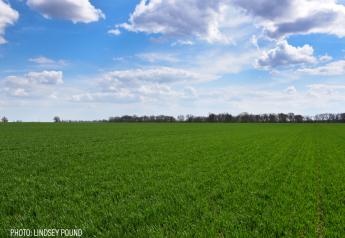First Thing Today | February 14, 2022

Soybeans under heavy pressure to open the week... Soybeans started firmer overnight but buyer interest dried up and selling pressure mounted, with futures near session lows this morning. Corn followed soybeans lower, while wheat mildly firmed. As of 6:30 a.m. CT, soybeans are trading 15 to 24 cents lower, corn is 1 to 3 cents lower, winter wheat futures are 2 to 4 cents higher with spring wheat mostly 3 to 5 cents higher. Front-month crude oil futures are modestly weaker, with the U.S. dollar index more than 200 points higher this morning.
Status quo for South American weather... Dry weather will raise crop moisture stress for the drier areas in central and northern Argentina as well as in far southern Paraguay and western most Rio Grande do Sul, Brazil, according to World Weather Inc. The weather forecaster says the remainder of Brazil will experience showers and thunderstorms periodically with the interior south getting just enough to support crops. Northern Brazil, especially from Minas Gerais to Mato Grosso will continue to be wet this week but will start to dry down a little next week as a high pressure system settles into the region.
Russia/Ukraine update... U.S. National Security Advisor Jake Sullivan told CNN on Sunday there’s “a distinct possibility that there will be major military action very soon.” A weekend call between the Russian and U.S. presidents proved inconclusive. But for weeks, various Biden administration officials have said a Russian invasion of Ukraine is “imminent.” Russian officials have said they do not intend to invade Ukraine. Meanwhile, Russian attack helicopters were spotted yesterday buzzing within miles of the country’s borders. Ukrainian President Volodymyr Zelensky asked President Joe Biden to come to Kyiv to “contribute to de-escalation” and to send “a powerful signal.” Ukraine demanded a meeting with President Vladimir Putin’s government to explain why Russia has amassed more than 100,000 troops along the countries’ shared border. Following talks between Putin and the presidents of the U.S. and France, German Chancellor Olaf Scholz will be next to try to talk Russia’s leader down. He visits Ukraine today and Russia on Tuesday.
Canadian trucker protest update... Canadian police on Sunday arrested protesters in a renewed effort to clear access to the Ambassador Bridge. The demonstrators, whose numbers had dwindled by Sunday morning, had mostly blocked traffic since last Monday in a bid to push governments in Canada to drop Covid-19 rules. The protests have choked trade between the countries and disrupted the supply chains of carmakers in Detroit. In the Canadian capital of Ottawa, protests raged on with hundreds of truckers entering their third week of occupation of the area around Parliament Hill. Meanwhile, a group of about 100 frustrated Ottawa residents staged a counterprotest on Sunday, upset with authorities for not doing more to shut down the Freedom Convoy.
Week ahead in Washington... The Senate will join the House in approving another stopgap spending bill for fiscal year 2022 ahead of the Feb. 18 deadline. The new continuing resolution (CR) will run through March 11, which means the fiscal year will be nearly half over before tardy appropriators reach agreement on spending. The CR will also provide another extension for USDA’s mandatory livestock price reporting system. Authority for the system was scheduled to expire last September but has been temporarily extended by stopgap spending measures. The key economic data this week will be Tuesday’s producer price index figures for January.
NCC projects cotton acreage to rise 7.3%... Based on its annual producer survey, the National Cotton Council (NCC) projects U.S. cotton acreage will rise 7.3% this year to 12.0 million acres. Assuming the state-level 10-year average abandonment rates and five-year average yields, NCC estimated 2022 harvested area at 9.8 million acres with an overall abandonment rate of 18.9%. U.S. production is estimated to be 17.3 million bales with an average yield of 850 pounds per acre.
Chinese official calls for increased soybean production... Chinese Vice Premier Hu Chunhua called for China to expand soybean production at a meeting on spring farm output held in Shandong province, Xinhua news reported. Hu also emphasized stabilizing planted grains acreage and strengthening farmland protection, reiterating policies previously laid out by central leadership. Hu did not give details on how to expand soybean acreage, though the country’s ag ministry last month promoted intercropping of soybeans with corn as one way to boost output. China’s leadership wants to increase soybean production to around 23 MMT by the end of 2025, up 40% from current levels. China’s Inner Mongolia region, the country’s second-largest soybean growing area, will expand soybean planting by 287,000 hectares this year, state media reported.
China sells virtually all wheat put up for auction... China sold 520,183 MT of state-owned wheat reserves at last week’s auction, 99.3% of the volume put up for sale, at an average sales price of 2,590 yuan ($407) per metric ton. China continues to sell nearly all of the state-owned wheat put up for sale, though prices are down from recent weeks.
Inflation policy debate... Inflation is rising at the fastest pace in 40 years, and it’s not clear when price pressures will abate. Even so, Nobel-winning economist Joseph Stiglitz says the Federal Reserve shouldn’t overreact. “A large across-the-board increase in interest rates is a cure worse than the disease. We should not attack a supply-side problem by lowering demand and increasing unemployment. That might dampen inflation if it is taken far enough, but it will also ruin people’s lives. What we need instead are targeted structural and fiscal policies aimed at unblocking supply bottlenecks and helping people confront today’s realities," he writes for the Roosevelt Institute. But Former U.S. Treasury Secretary and current Harvard professor Lawrence Summers has a different inflation perspective. Summers has called inflation the most serious short-run threat facing the U.S. economy and pushed the Fed to raise interest rates faster and higher than forecast. In a series of tweets responding to Stiglitz, he says “inflation denialism of the Stiglitz variety is a prescription for stagflation followed by recession.”
Most of Asia thus far is escaping a big rise in inflation... Inflation has surged to multi-decade highs in much of the world. But across most of Asia’s large economies, such as China and India, the pressure is far less extreme, the Economist notes. “The much more modest pace of price increases can be put down to three big “F” factors: food, freight and fun.” The global price of wheat is up by around 20% year on year but rice — the staple in many Asian economies — is down by around the same amount. Shipping-container prices have exploded for exports leaving Asia, but the return trips cost barely more than a tenth of that in some cases. The more gradual easing of Covid-induced restrictions means the cost of leisure activities has not picked up as much either. But the Economist warns: “There are still threats from a fourth “F”: foreign-exchange rates. If America’s Federal Reserve raises interest rates rapidly, a stronger dollar will increase import prices for many Asian economies. That will put central banks in the region in a tough spot.”
DOE to invest nearly $3 billion in advanced battery supply chains... The Department of Energy (DOE) issued two notices of intent Feb. 11 to invest $2.93 billion to support U.S.-based production of advanced batteries used in electric vehicles (EVs) and energy storage. The funding is part of $7 billion provided under the bipartisan infrastructure framework package (BIF) to strengthen the U.S. battery supply chain. It will support battery materials refining and production plants, battery cell and pack manufacturing facilities and recycling facilities. DOE said the funding will be made available in the coming months and aligns with the National Blueprint for Lithium Batteries, guidance released last year by the Federal Consortium for Advanced Batteries and led by DOE alongside the Departments of Defense, Commerce and State. The blueprint is focused on ensuring a domestic battery supply and promoting the development of “a robust and secure” domestic battery industrial base by 2030.
Money flow likely more important than fundamentals for cattle market... Traders took profits out of long positions in the cattle market and funds mildly liquidated some long positions the final two days last week. The short-term topping action in futures came despite firmer cash cattle prices. With this week’s cash trade not likely until midweek at the earliest, money flow will be the key determinate of price action in cattle futures for at least the first couple of days.
Early week price action key for hog futures... Price action the final two days last week suggested at least a short-term market top. That makes price action early this week extra important for hog futures. More selling pressure would suggest a market top is in place and a deeper corrective pullback is underway, while a strong rebound in prices would signal the downturn was just a correction to the bull market.
Weekend demand news... Taiwan tendered to buy 54,920 MT of U.S. milling wheat.
Today’s reports
- 10:00 a.m. Export Inspections — AMS
- 11:00 a.m. Feed Grains: Yearbook Tables — ERS






